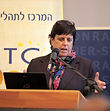
Managing Academic Internationalisation in Times of Crisis
Internationalisation is increasingly understood as a priority for higher education institutions and is essential for the development of higher education systems worldwide, including in Israel. The internationalisation of higher education requires a large degree of international cooperation and mutual trust. These elements become even more complex in times of crisis, as academic cooperation is subject to external influences and international pressures.
By their very nature, higher education institutions are international in character and as such often serve as a bridge to the world in times of crisis and war. Implementing internationalisation strategies and strengthening international ties between academic institutions are crucial to the establishment of a strong research community in unstable environments. At the same time, situations of crisis, whether due to political, economic or environmental circumstances, can constitute significant stumbling blocks for a proper transition towards academic internationalisation.
While the last century has seen its share of crisis and wars, it has also been characterized by the development of impressive international academic partnerships and networks. What are the obstacles to academic internationalisation in times of crisis? How can institutions and policy-makers overcome these challenges? The BGU-KAS Roundtable focused on these questions through a discussion of the challenges and potential answers to pursuing academic internationalisation in times of crisis.
The conference was divided in two parts: the first session was dedicated to a discussion of internationalisation processes developing in Israel today and the challenges posed by the current political context in the region. The second session offered an international comparative perspective providing insight from the experience of higher education systems which have faced different crisis. By focusing on the particularities of the Israeli case, as well as learning from the experience of various countries, the KAS-BGU roundtable aimed to initiate an informed discussion between Israeli policy-makers at both the national and institutional level. It is our hope that this discussion will lead the way for the development of proper responses aimed at furthering academic internationalisation in Israel, in spite of the country's specific challenges.
Prof. Hagit Messer‐Yaron, Vice‐chair ,Israeli Council for Higher Education
The International Nature of the Israeli Higher Education System
Prof. David Newman, Dean, Faculty of Social Sciences and Humanities, BGU
Academic Boycott on Israel - a threat to internationalisation?






